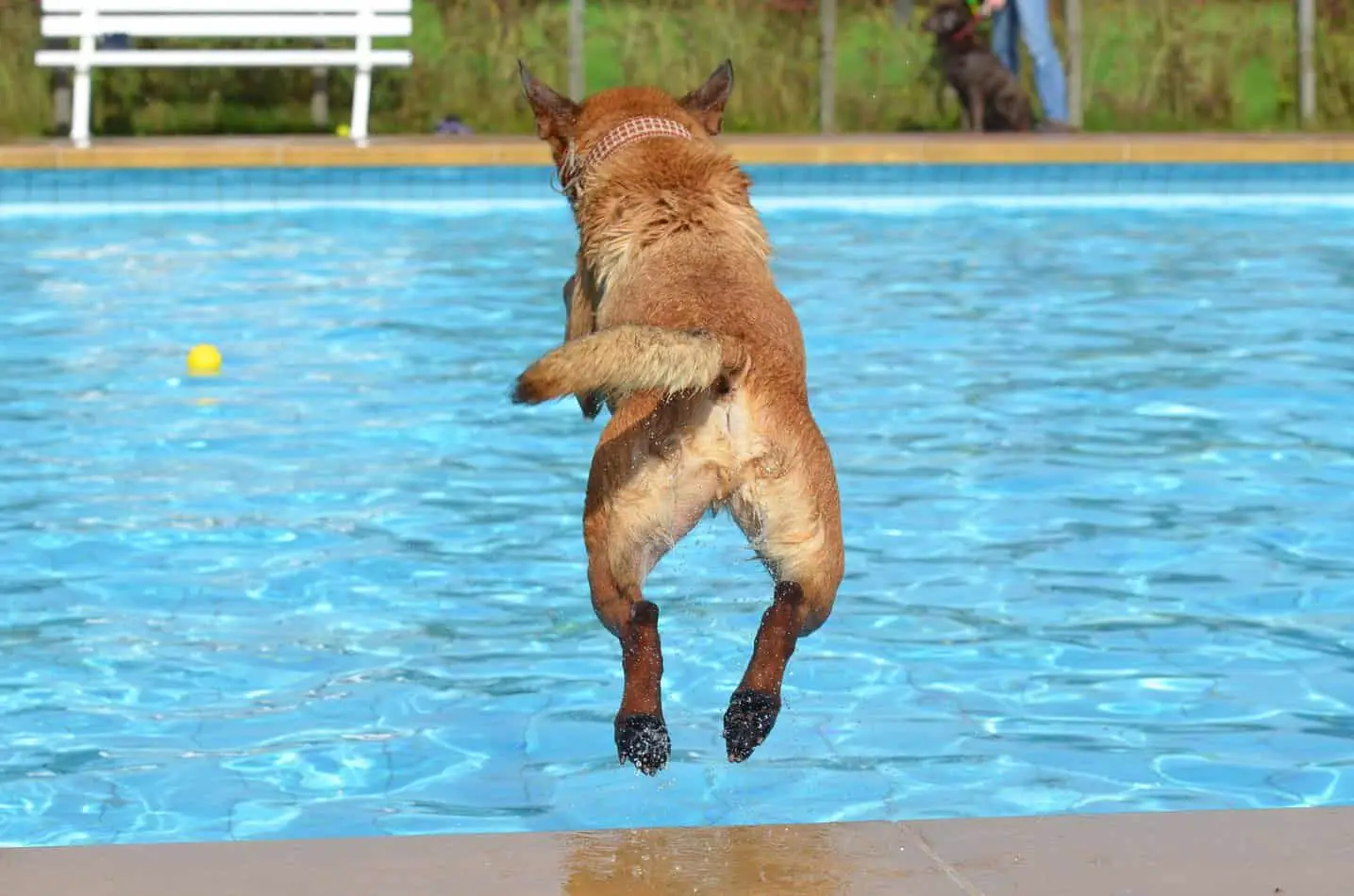We all know dogs love to swim and saltwater pools are no exception. No matter what the water is a dog is sure to want to splash around in it. From small dogs to big dogs, swimming is a priority, but can dos swim in saltwater pools.
Yes! Dogs can swim in saltwater pools. Saltwater pools have a low amount of salt compared to the ocean, at around 3200 ppm (parts per million). The salt water should have little effect on your dogs skin at these levels.
Despite your dog being able to swim in a saltwater pool, there are some important factors you need to remember if you are to let your dog swim in a saltwater pool.
Contents
Are Saltwater Pools Safe For Dogs
Generally speaking saltwater pools are safe for your dog, providing your follow some simple rules. during and after your dogs swim.
Firstly you should never let your dog ingest saltwater. This is especially true when they are in the sea, but also applies for saltwater pools. Even though saltwater pools have a low salt content, if your dog drinks a large amount they can become very ill. According to the American Kennel Club a couple of mouthfuls of saltwater would not be fatal for your dog. However, they also highlight that in some cases a couple of mouthfuls can cause some unwanted diarrhoea.
The second important part of allowing your dog to swim in a saltwater pool is ensure they are thoroughly washed off after they have been in. Despite saltwater being beneficial in small amounts, if not rinsed off it can cause irritation and damage to both the skin and your dogs fur. It is important that each time your dog goes swimming in a saltwater pool, that you wash them off with fresh clean water. If possible warm water is more beneficial when washing saltwater off and even the use of a high quality natural shampoo can help.
Is Saltwater Better Than Chlorine For My Dog
Saltwater pools tend to still have chlorine in them, it is just at a much lower level. According to Wikipedia Saltwater Chlorination systems break down salt into chlorine making a saltwater pool produce free chlorine at a certain rate. The difference between a chlorinated pool and a saltwater pool is the ways in which chemicals are added. As previously described saltwater pools produce their own chlorine at much lower levels and chlorine pools have chlorine added to them in the form of a tablet, these levels are usually much higher.
Much of the research available indicates that both saltwater and chlorine are safe at low levels. According to PetMD chlorine can cause irritation in the eyes and ears just like it can for humans. However, if a pool is properly maintained this shouldn’t be an issue.
Tips For Keeping Your Dog Safe In A Saltwater Pool
As mentioned before there is nothing wrong with letting your dog go in a saltwater pool. However, here are some things to do to ensure they are as safe as possible.
- Drinking Saltwater – This was mentioned above and is a vital part of keeping your dog safe. Providing plenty of fresh water for your dog to drink from is a good idea. Dogs tend to see a swimming pool as a giant water bowl and because they are rushing around everywhere they will soon need a drink. Keep an eye on your dog to ensure they don’t drink the pool water and are fully aware that the fresh water provided is where they need to drink. If your dog does ingest too much saltwater you will need to immediately contact your vet. For more information on the dangers of saltwater and what to look out for this article from the American Kennel Club has some helpful advice.
- Drying Up – If your spending the day next to the pool and your dog decides they want a break from swimming, you may not want to keep washing them off every time they exit the water. It is of course best to wash them with fresh water each time they exit the pool, but it may become difficult to keep track of them entering and exiting the pool. Saltwater will dry up the skin on your dog fairly quickly, however in the heat of the sun this process will be very quick. It is a good idea to provide your dog with plenty of shade so they don’t dry up too quick between swims. Helpful Tip: Setting up their bed with a parasol over it can be a more encouraging way to keep them shaded. Keep the bed near you as that’s where they will probably head.
- No Prior Washing – Your dogs skin is made to protect itself, much like our own. Oils are produced on your dogs skin to allow it to be protected. If you wash your dog before they enter either a saltwater or chlorinated pool you may be reducing the protection they have against these chemicals. The oil on your dogs skin is not the be all and end all of protection but leaving them oiled up will help reduce the effect of the saltwater on their skin.
Breed Type
Breed type can make a huge difference when allowing your dog to swim in a saltwater pool. Dogs are all different and so is their skin and fur.
Breeds with short wired fur can be affected by the saltwater a lot more easily,especially with the combination of sunshine. As you can imagine short haired breeds have coats that allow easy access to the skin. When swimming in saltwater the salt can easily contact the skin and stay on there for some time. Once your dog has exited the pool the sunlight can hit their skin just as easily. Its important with breeds like this that you are more vigilant over the course of their swim.
Double coated breeds can also have issues, as the saltwater gets trapped within their thick double coat. Although it takes more for the saltwater to contact the skin, it may stay in contact for longer as its much harder to wash out. Be aware that if your double coated breed of dog gets out of the pool for a rest the saltwater will still be in contact with their skin and wont rinse away as easily as short haired dogs. That being saying other double coated dogs like Labradors and Golden Retrievers are made for the water and have such oily coats that their skin will be protected much better than other dogs. As mentioned above you should not wash your dog before letting them in a saltwater pool as you can wash away the protection this oil gives them.
Conclusion
Overall it is perfectly safe to let your dog swim in a saltwater pool and as with anything you should remain vigilant to the factors that can jeopardise this safety. If you enjoyed this post then check out our other articles all about walking your dog and getting outside.
Here are some articles you may find useful –
“What age to teach a puppy to swim”
“Walking your dog on the beach”

